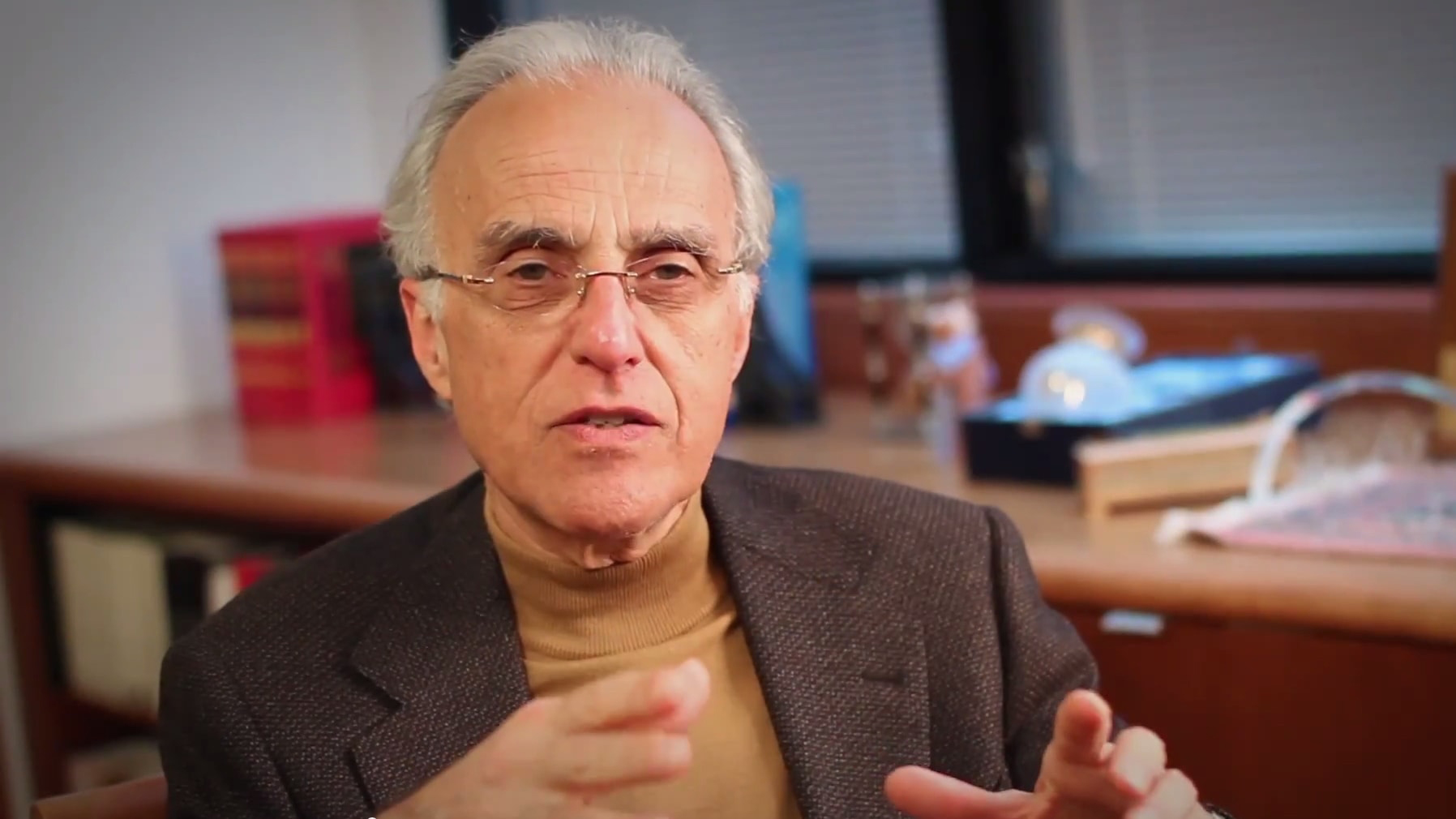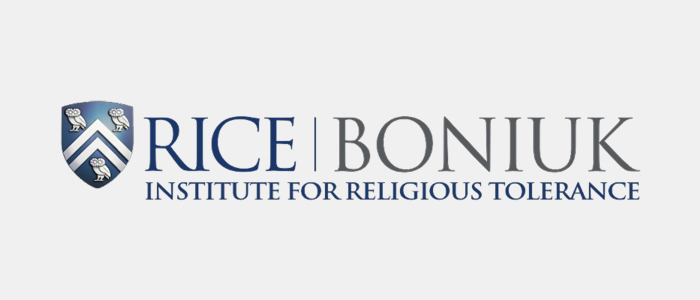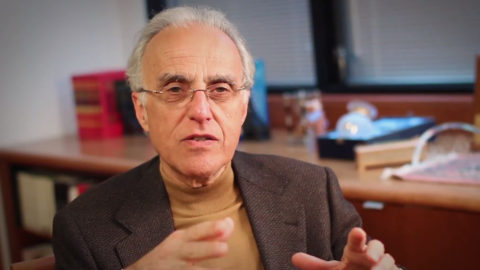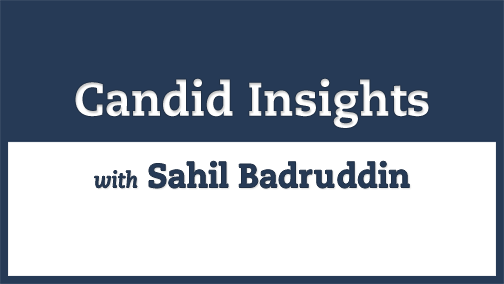John Esposito on the Challenges to Pluralism Today
EDITORS’ NOTE: John Esposito — Professor of International Affairs and Religion at Georgetown University and Director of their Bridge Initiative, that connects the academic study of Islamophobia with the public square — discusses his insights on Pluralism, Globalization, Religious Fundamentalism, Islam, the Media, Journalism, and Media Bubbles. This interview was published for the Boniuk Institute of Rice University.
Short Excerpts from the Interview
Perception of Muslims in the Media
Sahil Badruddin: You’ve often criticized that the media focuses on sensational, violent and negative stories of which the Muslim world has managed to offer over the past few decades. This dominates the news to the exclusion of many positive stories, which are often not reported, leading to a skewed perception of the Muslim world. What can be done to address this?
Dr. Esposito: That’s a really good question. The difficulty is, one has to keep in mind, that the media is a lot of other things in the US. It’s a business. They have to be concerned of particularly, survival. Newspapers and other such outlets. What we have is a world in which, as one very senior media person said to me, that what sells is conflicting and conflict discourse. …
The difficulty is, one has to keep in mind, that the media is a lot of other things in the US. It’s a business. They have to be concerned of particularly, survival. … What we have is a world in which, as one very senior media person said to me, that what sells is conflicting and conflict discourse.
I think there are a variety of things that can be done. One is, depending on who the persons are or the institutions, is reaching out to media with alternative kinds of programs. I think that, that’s really important. I think that organizations like UPF, which is based both, here on the East Coast, but also on the West Coast, they have dealt with — and also Impact, had dealt with – if you will, media moguls and organizations and production groups, but for the average person, if you’re in a community where you can mobilize a good number of people, then I think writing [to them] works. Otherwise, it doesn’t.
I remember a New York Times reporter was in my office. This was several years ago, I happened to comment that I was delighted that that day in The New York Times, they had two letters from Muslims responding and questioning some negative reporting. And she said to me, “Just remember that what gets their attention is if there are large numbers of such letters coming in.” In other words, it’s not as if, they just read and pick out a letter that’s well written. I think a lot of it is that kind of strategizing; I also think that, again, depending on who the people are, there are ways that, for example, if people are running programs, they can reach out to organizations like C-SPAN, but in planning your program, you’d have to be recognized. It’s got to be something that’s going to grab one’s attention.
What we do find from studies that have been done, particularly major studies have been done by Media Tenor. You could find them on the Internet. They have shown that incredible disproportion of coverage. For example, in one of their more recent studies, they found that 80% of the coverage of media in the US, Germany, and the UK was on violence and extremism. Even when you look at the mainstream coverage, it was kind of skewed. The mainstream coverage was not all that good and some of the mainstream coverage like great personalities tend to be dominated by warlords and terrorists. There’s a lot of such material out there. I’ve also written on it. It is a significant problem. …
Media Tenor … in one of their more recent studies … found that 80% of the coverage of media in the US, Germany, and the UK was on violence and extremism. … It is a significant problem.
Pluralism
Sahil Badruddin: I want to ask you a deeper question about pluralism. Pluralism sometimes gets confused with homogenization, making things similar or uniform but in reality, pluralism means embracing and respecting difference, seeing it as part and parcel of the world so we can learn from it. Could you speak to the importance of this?
Dr. Esposito: Yes, I think pluralism is the challenge in the 21st century. Just parenthetically, I’ve actually had situations where someone will come up to me and they’ll have heard me speak about pluralism and say, “Well, I asked my Imam or whomever about pluralism and then the explanation they give me was polytheism.” We’ve got a problem with people even understanding when we put the word out. For example, Bridge says, our title is Bridge: Protecting Pluralism, Ending Islamophobia. Now, what pluralism means is an acceptance of the diversity that exists in our society across the board, the diversity of ethnic groups, nationalities, as well as religious groups.
I think pluralism is the challenge in the 21st century. … Our title is Bridge: Protecting Pluralism, Ending Islamophobia. Now, what pluralism means is an acceptance of the diversity that exists in our society across the board, the diversity of ethnic groups, nationalities, as well as religious groups.
If we talk about, for example, religious pluralism, it has taken several decades for people to deal with it. When Catholics first started to get into or when it was raised to have a dialogue, let’s say with Protestants and/or Jews, the reaction of some Catholics were, “Why? What are we going to do? Are the people that are inviting us like it was a group that was initially let’s say, a Protestant group? Are they thinking about talking about conversion, etc.?” That same kind of attitude existed for many Muslims when the topic would come up in recent years. It still exists with some Muslims.
Pluralism means respecting other people. It means, first of all, seeking – First of all, if you live in a multi-ethnic, multi-religious society, you have to spend time knowing about others simply because they’re fellow citizens and you’re dealing with them and there are issues that have to do with that. Mutual understanding and respect, respecting the right of other people to believe what they believe and to, as it were, follow a way of life that they believe in, as long as there’s no danger involved, in terms of society. Getting to realize that diversity is actually a strength in societies. When you’ve got diversity and you emphasize the positive in other or the richness of other ethnicities and religious communities, there’s a strength there.
The problem too often is that people just think of the negative or they’re just afraid. There are many conservative Christians and Muslims, for example, who have been and some are still raised in a kind of fake situation in which they basically believe that only they are going to heaven and nobody else is going. Heaven is kind of a controlled place there. The reality of it is, for example, I’m astonished when I hear Muslims who fall into this trap because with the Quran itself and with the example of the Prophet himself, we see a recognition of religious diversity. The community in Medina, the sayings of the Prophet, and the interaction of the Prophet with other communities and the Quran, of course, talks very directly, in a way that’s more direct than the Bible, very specifically saying that Jews and Christians are people of the book. The Quran talks about that they should vie with each other in terms of doing good deeds, etc.. There are lots of passages in the Quran that deal with that. Now, in the Quran and the Bible, there are also passages that deal with conflict but again, those passages have to be seen in the context in which they occurred. Some of the passages that talk about, if you will, the other as a problem, will be in a context in which one would have been experiencing persecution, etc..
So I think that the issue of pluralism has never been more important. …
Pluralism means respecting other people. … First of all, if you live in a multi-ethnic, multi-religious society, you have to spend time knowing about others simply because they’re fellow citizens and you’re dealing with them and there are issues that have to do with that. … Getting to realize that diversity is actually a strength in societies.
Vision for the Future
Sahil Badruddin: We often talk about a vision for the future, but sometimes speak about it in general terms … Could you name a specific objective you can see the world achieve, let’s say in 25 years, and then what insights and suggestions would you offer that would address and achieve this vision?
Dr. Esposito: … I think that there were a couple of things that are certainly conceivable and possible. Number one, that things will get so bad in different respects that we’ll come to our senses and get back on the right track when it comes to issues of freedoms and democratization and civil liberties and that those things belong to all people. For example, if we’re looking at governments in Europe or the US, that things will get turned around. Right now, you look at Hungary, Poland, the Czech Republic, although they don’t have really many Muslims at all, if you look at the new leaders, their attitude is very Islamophobic and we see that in our own country today and also a real threat to democracy in our country.
I think that there were a couple of things that are certainly conceivable and possible. Number one, that things will get so bad in different respects that we’ll come to our senses and get back on the right track when it comes to issues of freedoms and democratization and civil liberties and that those things belong to all people.
I think in Europe, people are aware that these things can turn around. The debate is now occurring in the UK, be it over Brexit or going back to relations with the EU. It’s clearly that having moved in one direction, there’s now a strong sense on the part of many people in the UK that they’d like to get back to what they see as a better path. I think that also when it comes to dealing with examples in Europe and America, but also in Burma, in Myanmar etc., there’s every possibility that we can wind up with a movement from below on the part of people. Certainly, in terms of, in America and Europe. At some point, a movement from below that basically says, “We don’t want to have leaders or to have groups in our society that condone bias and discrimination and even at times, violence.” We have the ability to do that in many of our countries because we have a set of principles and values that we articulate and have articulated since we came into existence that would make for the growth of good governance and a strong sense of civil liberty. I think that kind of stuff has that possibility of turning around. It’s why I think the next presidential elections or the next congressional elections, we’ve just seen a real movement in terms of the recent congressional elections, a bouncing back in some ways. I think this kind of movement can take place, certainly, in other countries.
I think, religiously, where we are, as much as we have, on the dark side, we have a vibrant minority, but it’s a vibrant minority, that too often winds up being able to hold the day. We have a minority of people who do not operate in a constructive way with regard to interfaith relations. But I think we do see people responding to that, so to take an outrageous example. When you look at what’s happening to the Rohingya and also to the leaders in China right now, unlike a number of years ago, we are seeing more people mobilizing and more people, more groups raising these kinds of issues. Or what’s happened in Yemen with the bombing that goes on. Now, there’s a chance that Congress will revisit it and the kind of support that the Trump administration has given to Saudi Arabia in its war as it were in Yemen. …
It’s a matter of people continuing to mobilize and to move forward. I think all those possibilities are there. … I do see a lot more, at least I see a lot more in a consistent way. A lot more people, whether one is looking at the Internet, or one is looking at what happens on the ground, that are putting their bodies where their mouth is. That are, where you have diverse people. People of going into the streets, getting involved in programs and projects in which they are calling for significant change, of speaking out against violence against women. We have made some really great strides there. But I think we have to continue because, with the rise of the White Nationalism that we see, it’s racist and it threatens African Americans, it threatens “people of color”. All people of color and it threatens different people of faith. So I think that, yes, we can move forward but I think everybody has to keep in mind that this is not simply something that we can say, “Well, we’ll leave it to somebody else.” …
It’s a matter of people continuing to mobilize and to move forward. … A lot more people, whether one is looking at the Internet, or one is looking at what happens on the ground, that are putting their bodies where their mouth is. … I think everybody has to keep in mind that this is not simply something that we can say, “Well, we’ll leave it to somebody else.” …
About John Esposito
University Professor as well as Professor of Religion and International Affairs and of Islamic Studies at Georgetown University, John L. Esposito is Founding Director of the Prince Alwaleed Bin Talal Center for Muslim-Christian Understanding in the Walsh School of Foreign Service.
Esposito has served as consultant to the U.S. Department of State and other agencies, European and Asian governments and corporations, universities, and the media worldwide. He is a former President of the American Academy of Religion, the Middle East Studies Association of North America and of the American Council for the Study of Islamic Societies, Vice Chair of the Center for the Study of Islam and Democracy, and member of the World Economic Forum’s Council of 100 Leaders, and member of the E. C. European Network of Experts on De-Radicalisation and Board of Directors of the C-1 World Dialogue.
Esposito is recipient of the American Academy of Religion’s Martin E. Marty Award for the Public Understanding of Religion and of Pakistan’s Quaid-i-Azzam Award for Outstanding Contributions in Islamic Studies and the School of Foreign Service, Georgetown University Award for Outstanding Teaching. Editor-in-Chief of Oxford Islamic Studies Online and Series Editor of The Oxford Library of Islamic Studies, Esposito has served as Editor-in-Chief of The Oxford Encyclopedia of the Islamic World (6 vols.); The Oxford Encyclopedia of the Modern Islamic World (4 vols.), The Oxford History of Islam, The Oxford Dictionary of Islam, and The Islamic World: Past and Present (3 vols.). Esposito has published more than 45 books which have been translated into 35 languages.




